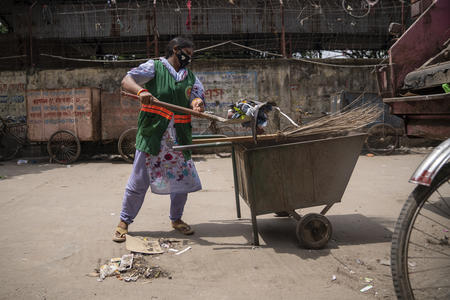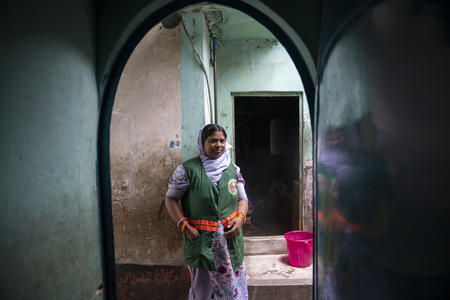Kona - Bangladesh

The pandemic has had a shattering impact on the lives of people in this densely populated country, where 22% of people rely on unhygienic toilets and another 23% use shared toilets.23 Sanitation workers have seen their income plummet and those who have continued to work have had to put themselves and their families at risk.
Case Study: Kona Nagmoni Lata, 32, street sweeper
Kona Nagmoni Lata, 32, works as a sweeper, cleaning rubbish and public toilets. She lives with her husband and three daughters in a crowded settlement, where most people share toilets with other families. She regularly comes in direct contact with human waste and toxic gases without wearing adequate safety equipment. Her workload has increased during the COVID-19 pandemic, although she has not been paid extra, and she worries about the risks.
"There’s more work as people throw away more rubbish than before. Nowadays, I often find many pillows and blankets thrown everywhere. I clean it up, but I wonder where it comes from. Was it from the bed of a COVID-19 patient? Will it infect me?” She is aware of the importance of handwashing and social distancing to prevent the spread of the virus.
Handwashing isn’t always an option. Sometimes, I come into contact with human faeces in my work, but I can only wipe it off with a cloth. There are no handwashing stations where I work so I have to wait to go back to the office to wash my hands. And it is impossible to social distance. People are walking around me all the time. Some wear masks and some don’t.”
As well as risking exposure to COVID-19, Kona also deals with broken glass, faeces and other forms of rubbish but she feels she has no choice but to accept the dangers of her job. “They say we are front line workers, but I don’t know what that means. We never get bonuses. People who worked during COVID-19, in other professions, spoke of getting extra money, but we get nothing,” she says.
“It’s hard work and if something happens to me during the course of my job, I will get no compensation.” Kona has now had both doses of the COVID-19 vaccine and feels a little safer but still faces challenges, “My biggest challenge is the public,” she says. “People are often unkind to me in the street, and it feels bad having to hear constant reprimands from people I am trying to help. I feel disposable.”

